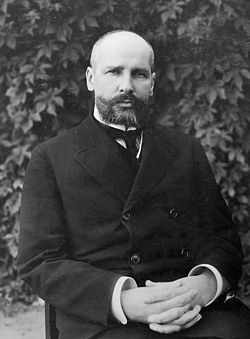Tadeusz Czyzewski
This article is incomplete because it is pending further input from participants, or it is a work-in-progress by one author. Please comment on this article's talk page to share your input, comments and questions. Note: To contribute to this article, you may need to seek help from the author(s) of this page. |
Tadeusz Czyzewski Тадеуш Чжевський | |
|---|---|
 Czyzewski in 1920 | |
| 5th President of Narozalica | |
| In office December 5, 1913 – January 19, 1921 | |
| Prime Minister | Denys Dorosh Vladislav Pudovkin Kyrylo Cheban |
| Preceded by | Pyotr Petrovich |
| Succeeded by | Vladislav Pudovkin |
| 6th and 8th Prime Minister of Narozalica | |
| In office January 19, 1906 – March 4, 1910 | |
| President | Maksym Ilchenko |
| Preceded by | Ivan Zayets |
| Succeeded by | Vladislav Pudovkin |
| In office August 26, 1912 – December 5, 1913 | |
| President | Pyotr Petrovich |
| Preceded by | Vladislav Pudovkin |
| Succeeded by | Denys Dorosh |
| Personal details | |
| Born | Tadeusz Czyzewski January 3, 1878 Tarcław, Miersa Governorate, Narozalica |
| Died | May 14, 1949 (aged 71) Krada, West Miersa |
| Citizenship | Narozalica |
| Nationality | Miersan |
| Political party | Independent |
| Spouse | Olena Rydenko (m. 1901) |
| Children | 5 |
| Education | University of Samistopol |
Tadeusz Czyzewski (Narodyn: Тадеуш Чжевський; Tadeush Chzhevs'kyy, 3 January 1878 – 14 May 1949; aged 71) was a Miersan-born Narozalic politician and stateman who served as the 5th President of Narozalica between 1913 and 1921, as well as the 6th and 8th Prime Minister of Narozalica between 1906 and 1910, and again between 1912 and 1913. The last of Narozalica's independent presidents, Czyzewski ideologically called himself a "conservative socialist", however his views have been categorised into paternalistic conservatism in the modern-day. To this day, Czyzewski is the only left-wing president in Narozalica's history.
Born into an aristocratic Miersan hussar family in 1878, Czyzewski's economic status saw him accepted into the University of Samistopol in 1897, where he studied economics and graduated in 1900. He originally became an accountant in Samistopol for two years before entering politics in 1902. A successful econometrician within Narozalica, his speeches, manifestos and policies gained him recognition within Narozalica's political elite, and Czyzewski saw increased praise of his work as he quickly rose up Narozalica's political ladder, before being appointed as Maksym Ilchenko's only Prime Minister in 1906. Under Ilchenko, Czyzewski attempted to bring forward his left-wing policies, believing the aristocracy had moral and social obligations to support the nation's poorer populace, especially within the cities. Ilchenko, however, disapproved of these policies and refused to give them his assent, with their agreements coming mainly on their social policies and foriegn affairs. Ilchenko resigned in 1910 and was succeeded by Pyotr Petrovich, who had previously served as President. Czyzewski served briefly as Petrovich's second prime minister between 1912 and 1913, before he succeeded Petrovich after he resigned due to his inability to quickly respond to the Great Collapse.
Czyzewski's early presidency and policies were popular among the urban peasantry, who were suffering from rapidly increasing poverty in light of the Collapse. Czyzewski planned for an increasing amount of government-backed industry in the cities, seeing much of the peasantry working industrial factory jobs backed and paid for by the government. The policy was successful initially, but by 1917, around the height of the subsequent economic depression that followed the Collapse, the government could no longer feasibly continue to fund the working peasantry without suffering severe economic drawbacks. Due to this, Czyzewski was forced to close down some of the factories he had opened and make thousands of workers redundant. The quick change made Czyzewski extremely unpopular within the urban centres - his main support group - as well as losing much of the backing of his supporters, with Pudovkin stepping down from his prime minister role in 1920. Faced with little other option, Czyzewski resigned in 1921 and was succeeded by the more hardline Vladislav Pudovkin. After his political career, Czyzewski campaigned against the growing threat of war and later against Narozalic involvement in the Great War. After the war, Czyzewski was a vocal opponent of the Godfredson Plan, and supported Miersan reunification, however his influence was limited mainly to talks and lectures in universities across West Miersa. Czyzewski died at his house in Krada in 1949, aged 71.
Czyzewski is a controversial figure both within and outside of Narozalica. His supporters say he was influential in mitigating the damage the Great Collapse had on Narozalica, which was less than many of its eastern Euclean counterparts, and paved the way for Narozalica's modern mixed-market economy. However he is also criticised for the last four years of his presidency, which saw sharp increases in unemployment and large amounts of inflation in the economy, and is also criticised by more right-wing politicians for his socialistic policies, which they claim tarnished much of the economy before Pudovkin's presidency and the war.